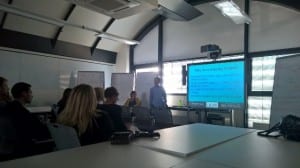The latest CaHRU/LIH Improvement Science and Research Methods seminar was on scoping reviews, delivered on 28th February 2017 by Viet-Hai Phung, Research Assistant at CaHRU. Viet-Hai began the seminar by stating the aims of scoping reviews: to “map rapidly the key concepts underpinning a research area and the main sources and types of evidence available, and can be undertaken as stand-alone projects in their own right, especially where an area is complex or has not been reviewed comprehensively before” (Mays et al., 2001: 194).
Viet-Hai who is currently conducting a scoping review as the first phase of his PhD, explained that he is doing this because the extent of knowledge on the evidence relating to his research area in ‘healthcare experiences of migrants in Europe’ is limited. Secondly, the scoping review will help to establish themes or research questions for further exploration using appropriate research methods.
He went on to outline the features and steps to conducting a scoping review and took time to explain each in detail, placing emphasis on the need to have a well-defined search strategy for capturing all potentially relevant studies. He also recommended the use of EndNote and Excel for managing the studies or data generated from the search, which can facilitate the identification and inclusion or exclusion of studies from the review. Constructing a flow diagram can also help in presenting a summary of the study identification process.
 For the synthesis of the data generated, Viet-Hai suggested that reviewers may summarise each of the included studies according to relevant headings: population, methods, results etc, and thematically summarise the evidence from the review using a narrative, reflective approach.
For the synthesis of the data generated, Viet-Hai suggested that reviewers may summarise each of the included studies according to relevant headings: population, methods, results etc, and thematically summarise the evidence from the review using a narrative, reflective approach.
He concluded the session by highlighting a number of caveats which should be noted when planning to conduct a scoping review. He said, for example, that some search terms may need to be adapted or modified for different databases, and that only a limited number of publications can be imported to Endnote at a time. In addition, many publications have copyright statements that need to be removed in Excel, and that data extraction can be time consuming.
By Joseph Akanuwe
[su_document url=”https://communityandhealth.dev.lincoln.ac.uk/files/2017/03/Scoping-review-28-February-2017.pdf” responsive=”no”]Multi-morbidity, goal-oriented care, the community and equity[/su_document]
